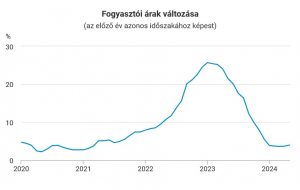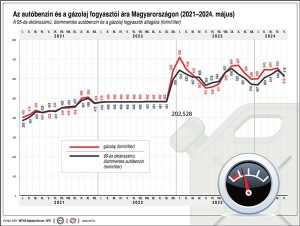
Food price developments in 2024, unlike the previous two years, could pull inflation down rather than up.Continue reading

Inflation in Hungary has fallen on a monthly basis. Consumer prices fell by 0.1% from April to May. The data was dragged down by energy and fuel prices. On an annual basis, the Hungarian Central Statistical Office (KSH) measured inflation at 4.4%, not much higher than the central bank’s target level, Világgazdaság reports.
Compared to April, prices fell by an average of 0.1% in May, while fuel prices fell by 4.4%.
On an annual basis, consumer prices were on average 4% higher.
Food prices rose by 1% annually, including:
Within the group, the price of eggs fell by 22%, flour by 19.6%, dairy by 11.6%, dry pasta by 10.6%, milk and bread by 9% each, cheese by 7.4%, and poultry by 6%.
Services rose by 9.5%, including:
Prices of alcoholic beverages and tobacco products rose by 3.5%, including tobacco by 3.8%. The price of medicines and pharmaceuticals rose by 6.4%, washing and cleaning products by 2.7%, and personal care products by 1.8%.

Source: KSH
Household energy was 2.4% cheaper, including 4.7% for gas and 2.9% for electricity. The price of durable consumer goods fell by 1.7%, with used cars falling by 9.6%, new cars by 4.8%, kitchen and other furniture by 2.5%, heating and cooking equipment by 2.4%, and household furniture by 1.7%. Vehicle fuels rose by 9.2%.
Consumer prices, however, fell by 0.1 percent on average on a monthly basis.

Changes in fuel prices (2021-2024). Picture: MTI
Food prices rose by 0.1% on average, including:
Within the food category, the price of some products fell:
The largest increases, of 0.9% were in services, including domestic holidays up 3.4%, condominium common charges up 1.0%, and vehicle repair and maintenance up 0.9%.
Household energy, however, was 0.9% lower, including 1.7% for gas. Vehicle fuel prices fell by 4.4%.
Via Világgazdaság, Featured image: Pexels